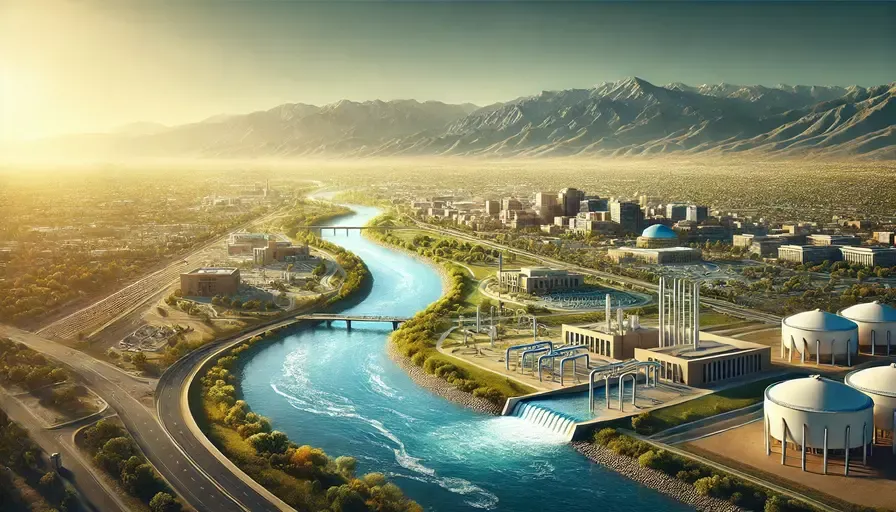Water is an essential resource for any city, and Albuquerque, New Mexico, is no exception.
From everyday household needs to specialized professions like house painters who require clean water for their projects, a reliable water supply is vital.
This vibrant city, nestled in the high desert, relies on a complex system of water sources and management to ensure that its residents have access to clean and reliable water.
In this article, we’ll explore where Albuquerque gets its water from, how it is managed, and the challenges faced in ensuring a sustainable water supply.
Breakdown of Albuquerque’s Water Sources
Albuquerque’s water comes from a combination of surface water and groundwater. This blend is crucial in maintaining a steady supply, especially given the region’s arid climate.
Surface Water
The primary source of surface water for Albuquerque is the Rio Grande. This river, which flows from the mountains of Colorado, provides a significant portion of the city’s water supply. The San Juan-Chama Project is a critical infrastructure project that diverts water from the Colorado River Basin to the Rio Grande, boosting the available surface water for Albuquerque.
Groundwater
Albuquerque also relies heavily on groundwater, sourced from the Albuquerque Basin aquifer. This aquifer is a vast underground reservoir that has been tapped for decades to meet the city's water needs. Groundwater is particularly important during drought periods when surface water sources may be insufficient.
The Role of the Albuquerque Bernalillo County Water Utility Authority (ABCWUA)
The Albuquerque Bernalillo County Water Utility Authority (ABCWUA) is the primary agency responsible for managing Albuquerque’s water resources. ABCWUA ensures that the water supply is clean, safe, and reliable for all residents.
Water Treatment
Before reaching homes and businesses, water from both surface and groundwater sources undergoes extensive treatment. The ABCWUA operates several water treatment plants that remove impurities and contaminants, ensuring the water meets all federal and state quality standards.
Water Distribution
Once treated, the water is distributed through a network of pipelines and storage facilities. The ABCWUA maintains this infrastructure to prevent leaks and ensure efficient delivery. Regular maintenance and upgrades are essential to keep the system running smoothly.
Challenges in Albuquerque’s Water Supply
Ensuring a sustainable water supply in Albuquerque comes with several challenges, primarily due to the region's climate and growing population.
Drought and Climate Change
Albuquerque is located in an arid region that experiences frequent droughts. Climate change exacerbates this issue, leading to more prolonged and severe drought periods. These conditions put immense pressure on both surface and groundwater sources.
Overdraft of Groundwater
Historically, Albuquerque has relied heavily on groundwater, leading to concerns about overdraft and depletion of the aquifer. Overdraft occurs when water is pumped from the ground faster than it can be naturally replenished. This can lead to a decline in water levels and long-term sustainability issues.
Efforts to Ensure Sustainable Water Management
To address these challenges, the ABCWUA and other agencies have implemented various strategies and initiatives aimed at ensuring a sustainable water future for Albuquerque.
Water Conservation Programs
Water conservation is a critical component of Albuquerque’s water management strategy. The ABCWUA has implemented numerous programs to encourage residents and businesses to reduce water usage. These include rebate programs for water-efficient appliances, xeriscaping incentives, and public education campaigns.
Aquifer Recharge Projects
To combat groundwater depletion, Albuquerque has invested in aquifer recharge projects. These projects involve directing surface water into the aquifer to replenish it. Managed aquifer recharge helps maintain water levels and ensures a more sustainable groundwater supply.
Advanced Water Treatment Technologies
The ABCWUA continuously invests in advanced water treatment technologies to improve efficiency and water quality. These technologies help remove emerging contaminants and ensure that the water supply remains safe and reliable.
Future Outlook for Albuquerque’s Water Supply
As Albuquerque continues to grow, ensuring a sustainable water supply will remain a top priority. The city and its water utility authority are committed to proactive management and innovative solutions to meet future water needs.
Integrated Water Management
Integrated water management approaches that consider the entire water cycle, from sourcing to usage and reuse, will be crucial. This holistic approach ensures that all aspects of water management are optimized for sustainability.
Community Involvement
Community involvement and education are key to successful water management. By engaging residents in conservation efforts and raising awareness about water issues, Albuquerque can foster a culture of sustainability.
Technological Innovations
Continued investment in technological innovations will play a significant role in securing Albuquerque’s water future. From advanced treatment methods to smart water grid technologies, these innovations will enhance the efficiency and reliability of the water supply system.
Conclusion
Albuquerque’s water supply is a blend of surface water from the Rio Grande and groundwater from the Albuquerque Basin aquifer.
The city’s water management, overseen by the ABCWUA, involves extensive treatment and distribution processes to ensure clean and reliable water. However, challenges such as drought, climate change, and groundwater depletion necessitate proactive strategies and innovative solutions.
Through conservation programs, aquifer recharge projects, and technological advancements, Albuquerque is working towards a sustainable water future. Community involvement and integrated water management will be key to meeting the city's growing water needs and ensuring long-term sustainability.
By understanding where Albuquerque gets its water from and the efforts being made to manage it, residents can better appreciate the value of this vital resource and contribute to its conservation.
Read more: The Benefits of Hiring a Professional Painting Contractor
